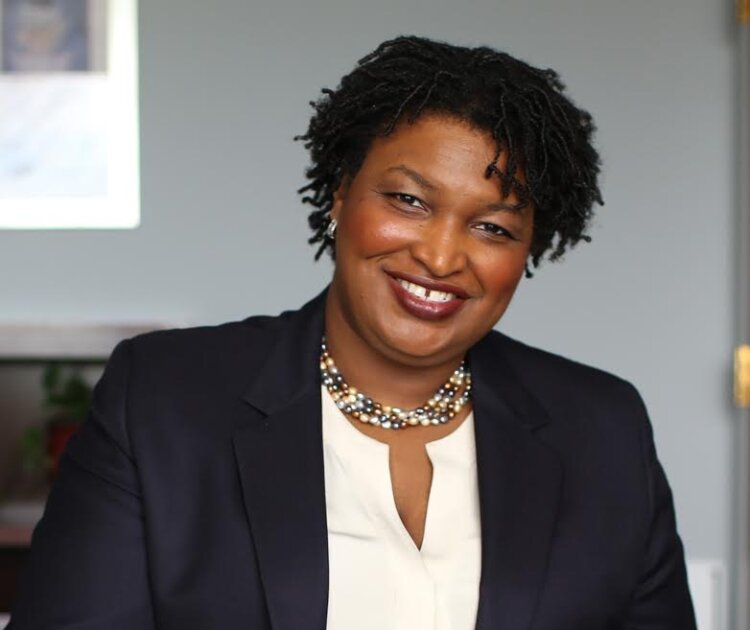
When Stacey Abrams speaks it is hard not to listen. The daughter of Methodist ministers, Abrams has a cadence and conviction that demands and captivates the audience’s attention. Canvassing Georgia earlier this year to be the Democratic candidate for governor, Abrams delivered her stump speech again and again in front of trade unions, church congregations, dockworkers, in parks and private homes, on college campuses and in art galleries.
She told the story of an honest and modest upbringing, one of six children in a family that valued education, hard work, and service. Her parents, growing up in the Jim Crow south, overcame the adversity of poverty, segregation and, in the case of her father, dyslexia, to go to college together. They were Freedom Fighters and, says Abrams, “did everything they were supposed to,” but still fought for every paycheck and struggled in between them. Yet her family ethos was one of service to others. “We may have had little, but we had each other,” Abrams has said, “and so we had a duty to serve.”
That ethic propelled Abrams to Spelman College and then Yale Law School, to a career as a tax attorney (and a successful side hustle as a romance novelist under the nom de plume Selena Montgomery), and finally to her role as minority leader in the Georgia State Assembly.
That’s when she started making history. Abrams was the first female leader of either party and the first African American leader in the House of Representatives.
On May 22, Stacey Abrams made history again when she became the first woman to win a gubernatorial primary in Georgia. If she is elected governor on November 6, she will be written into history books as the first African American female governor in the entire country. She would also be pulling off a major coup in a state as red as the clay that lies beneath it. But Abrams is energized by that challenge. She and her campaign are banking on a Democratic resurgence in the wake of Trump, changing demographics in this Southern Republican stronghold and the simple idea that all she needs to triumph is for the right voters to be mobilized.
She became the first woman to win a gubernatorial primary in Georgia. If she is elected governor on November 6, she will be written into history books as the first African American female governor in the entire country.
To that end, Abrams launched the New Georgia Project in 2013, a nonpartisan effort to register voters of color and reports that the organization submitted 200,000 registrations for voters of color between 2014 and 2016. She will need them to work hard between now and election day.
Abrams is not looking to win over conservatives, but to inspire progressives. She wears endorsements from NARAL, Planned Parenthood and Georgia’s largest LGBTQ group, Georgia Equality—as well as her low rating from the NRA—on her sleeve. “We have the power to win the highest office in Georgia” she told NetRoots Nation last year, “and I don’t have to change my hair, my gender, my skin color. I don’t have to change a thing about myself and we can win here in Georgia.”
That’s just a glimpse of her badassery. In April, when her finances were made public and some raised concern that her $50,000 debt to the IRS should possibly disqualify her from running for public office, Abrams turned her own story into a commentary on how hard it is for people of color to break out of cycles of poverty and lead. In a remarkably honest piece for Fortune she detailed her student debt, her overdependence on credit cards in college, and the necessity for her to support her parents as they raised the five-year-old daughter of Abrams’ brother—who suffered from drug addiction—while racking up medical bills in their old age.
“I suspect my situation will sound familiar to others who are the first in their families to earn real money. Money dictates nearly step of social mobility from the very first moments of life,” wrote Abrams. “The difficulty of catching up and moving forward isn’t all in your head. Systemic biases, legacy barriers, and current explosions of inequality conspire to undermine wealth generation among minorities, and especially women in these communities. But, as with all obstacles, our obligation is to acknowledge they exist and then fight like hell to circumvent them.”
That’s what Abrams hopes to do.
As she finishes her stump speech, she grows quiet and sets into a story about her father walking home from work in the wee hours of a rainy night. Before becoming a minister, her father was a shipyard worker, because his dyslexia prevented him from getting other work. Since the family had one car, he carpooled to and from the shipyard. But on nights when he had to pull a double (or more), he had to walk home and would call his family before leaving work, so they would know when to expect him.
This particular night Abrams’ mother was concerned—knowing that a black man “walking down a dark Mississippi in the dead of night was the beginning of a terrible story.” She gathered her children into the car and set out to find him at three in the morning. Stacey and her sister sat lookout by the windows till they finally spied their father’s figure in the dark. Getting in the car, wet and cold, he cranked the heat. Abrams’ mother asked where his coat was. “I gave it to a man on the beach,” he answered. To which she replied, “Ok.” Their mother’s response dumbfounded Stacey and her sister who had been schooled in the lesson of never losing a valuable piece of clothing. So, her sister shyly asked, “Daddy, why did you give that man your coat?”
He told her, “I gave that man my coat, because when I came upon him on that beach he was alone, and I knew when I left him there he would still be alone. But I could give him my coat, because I knew you were coming for me.” Abrams pauses at this point in the story and then, gathering steam, she tells the assembled audience, “Georgia, I’m coming for you.” When she does, she might could spark the second coming of the Democratic party.


Grok Nation Comment Policy
We welcome thoughtful, grokky comments—keep your negativity and spam to yourself. Please read our Comment Policy before commenting.